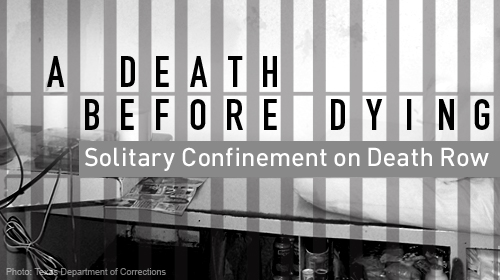
Alfredo Prieto sits alone 23 hours a day in a locked, seventy-square-feet box. The lights never go out.
According to trial records, Prieto grew up in tough circumstances in war-torn El Salvador, escaped with his family to California. He became involved in gangs and violent crime, culminating ultimately in his conviction for rape, larceny and double murder in Virginia. But during his eight-year incarceration, Prieto has been by all accounts a model prisoner. He is one of eight men who await execution on Virginia's death row.
Virginia locks its death-row prisoners in solitary confinement and throws away the key, no questions asked, until they are released due to successful appeal or executed. And Virginia is not alone. For many, a death sentence means a double punishment. As we documented extensively in our report A Death Before Dying, people on death row can spend decades locked alone in a tiny, cement room before they are ever strapped to an execution gurney, dying a slow and painful psychological death in solitary confinement before the state executes them.
No other class of prisoners is automatically locked alone with no end in sight.
But this week, a Virginia federal court looked past the murder convictions and death sentence Prieto is still challenging (in the lengthy capital appellate process), and held that the U.S. Constitution still affords him rights. In a case brought by Prieto, District Court Judge Leona Brinkema has ruled that Virginia's automatic placement of death-row prisoners in solitary confinement – without any process in which the prisoner could challenge the placement, and certainly without respect to their dangerousness, misconduct, or any other individualized reason – violates the right to due process guaranteed by the Constitution.
This is the first time any court in this country has made such a ruling.
We know that the death penalty system is broken. Racial bias, junk science, underfunded public defense, and other serious breakdowns in our legal system can mean that people – sometimes innocent people – will languish on death rows for years while pursuing appeals. With a nod to the possibility of change, redemption, and that an innocent person has been wrongly sentenced to death, Judge Brinkema noted that death-row prisoners "have obvious incentives to behave well and take rehabilitation seriously, including the possibility that new forensic evidence might undercut a conviction, a habeas petition might be granted, or that good behavior might improve the prospects of a commuted sentence."
This means that, at least in Virginia, there's a hope that people on death row will no longer be automatically barred from the company of other prisoners. There's a chance their human contact will no longer be limited to the occasional visits of prison officials or medical personnel to their cell. Perhaps they'll no longer spend years alone in cells that have no real window, only a narrow mesh slot to let in natural light. Maybe they will be allowed more than five recreation hours per week, and will no longer be limited to a recreation cell that is at best slightly larger than the one in which they spend the rest of their time.
Judge Brinkema's opinion, as required under due-process analysis, also asked whether the prison afforded death-row prisoners any process to rebut the state's supposed need to impose this "atypical and significant hardship." She found, as is true of virtually all other death rows, that there is absolutely no such process.
According to Judge Brinkema's ruling, something must change in Virginia. The state must mitigate the living conditions on death row, or place Prieto and the other men in conditions according to ordinary prison classification procedures (which base restrictions, such as solitary confinement, on behavior).
With courage, Judge Brinkema has held that the Constitution continues to apply, even for people sentenced to death. They remain people, and the Constitution remains in force. If justice is truly blind, this ground-breaking ruling will eventually become the law of the land.
Learn more about the death penalty and other civil liberty issues:Sign up for breaking news alerts, , and .


